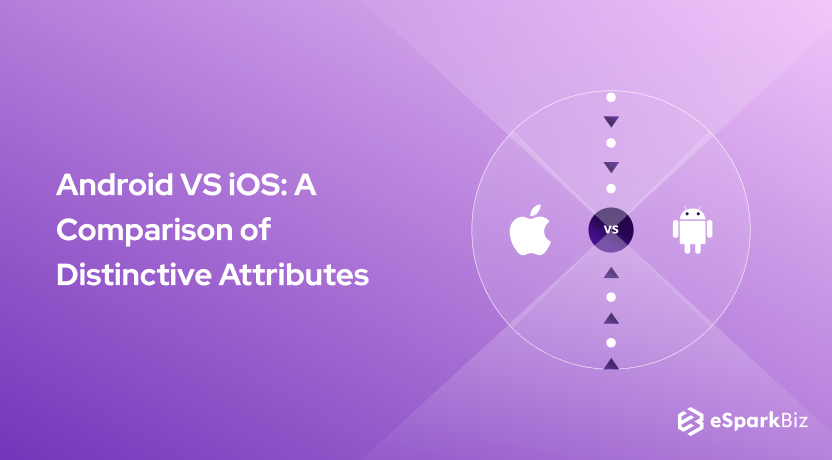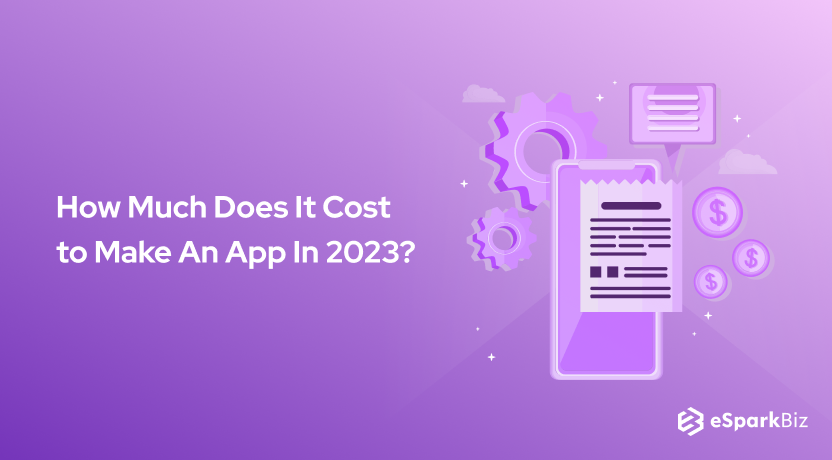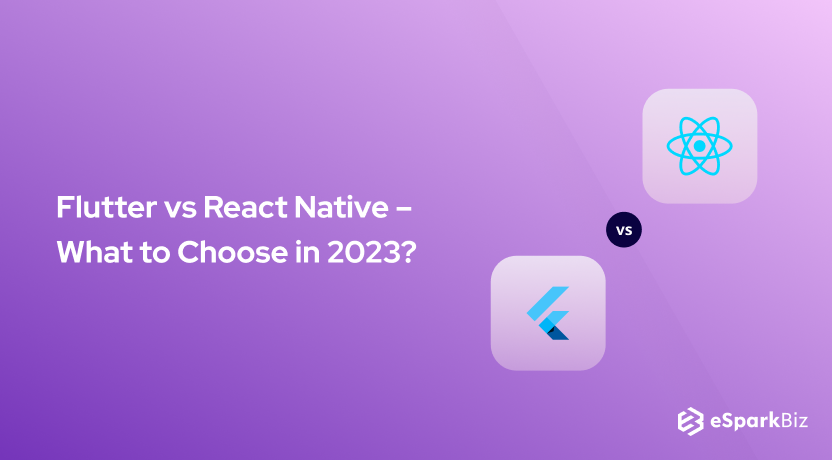Android & iOS are the two most dominant driving forces behind the smartphones that came into the market in the last decade. Apple’s iOS made an entry into the world market in 2007 while Google’s Android operating system came in 2008. At present times, 99% of the global smartphone OS market is captured by Android and iOS.
As they both compete to acquire market dominance, it was reported in 2020 that 71.93% of the global mobile OS market share was owned by Android while iOS owned 27.47% market share. On the other hand, App Store purchases in 2020 grossed to $72.3 billion while Play Store purchases amounted to $38.6 billion.
There are often a lot of comparisons drawn between Android and iPhone features, price, other tech specs, and their overall performance. So, in this blog, Android is pitted against iOS to discover the ultimate winner, feature-wise.
Feature-Wise Comparison of Android vs iOS

Below are the key aspects of technical differences between Android Vs iOS.
1. Development Aspect
This is the most technical aspect of the difference between Android & iOS. Under this, you will understand how Android is different from iOS from the point of development complexities and how its prime difference impacts the cost of production.
OS Family: Android belongs to the OS family of Linux while iOS belongs to OS X and UNIX.
Source Model: Android is an open-source platform. Android kernel, UI, and some apps are completely open-source. Whereas, the iOS kernel is not open-source; however, based on open-source Darwin OS.
App development complexity: iOS app designing is less complex and easier to build compared to Android application development. This is due to the fact that Android caters to a wide variety of devices including smartphones and tablets from various hardware providers. On the other hand, all iOS-based devices (iPhones, iPads, and iPods) belong to Apple alone.
Time needed for development: Due to the complexity associated with Android app development, it is considerably more time-consuming than iOS app making.
Cost of app development: There are two factors that influence the cost of development of Android and iOS apps. The first factor being the time of development and the second factor is the hardware used for development.
Android apps take more development time but can be built using the Android Studio application that can be easily installed on any regular Windows PC. Whereas, iOS apps can be designed in a shorter time; however, developers need to use XCode, which functions only on Mac, thereby increasing the cost of development.
Supported Coding Languages: When it comes to the programming languages used in Android and iOS development, there is a vast difference between the two. Android developers prefer using Java, C, C++, and Kotlin but iOS developers use Objective C or Swift.
App Publishing: Android apps can be published more quickly and easily on Play Store. Developers have to pay a $25 one-time registration fee and then publish their apps endlessly and easily. This is different in the case of the Apple App Store which has a long approval process.
Winner: Based on the above comparisons, iOS emerges as a clear winner.
2. Software Updates
First and foremost, iOS software upgrades and security patches are done consistently and frequently. Second, iOS upgrades are available to all iOS devices at once including very old models too.
Android software updates are not released so frequently and even when they are released, they may not be available to the old models. Besides this, updates are only offered after several months of the release of the most recent Android version.
If you go by statistics:
- 80% of iOS 14 updates have happened.
- Less than 1% of Android 11 updates have been initiated and completed so far.
- Similarly, Android 10 & Android 9.0 Pie update stats stand at 8.2% and 31.3% respectively.
Thus, you can see that most of the iOS platform-based devices are running on the current software version which is the stark opposite of Android devices which still represents a scattered distribution in terms of software upgrades.
Winner: Here too, iOS wins the battle.
3. Customizability
The Android operating system offers more flexibility to add widgets, transform the layout of the home screen, or change the entire UI via launchers. Thus, as an Android user, you can customize your phone easily without the need for jailbreaking.
Even rooting and jailbreaking are easier on Android devices that lets you take complete control over your device. Alternative app stores are more easily accessible on Android.
iOS is stricter when it comes to customization. It is almost impossible to gain full control over an iOS device as even jailbreaking and rooting is possible only up to a limited extent. Thus, third-party app stores aren’t available on Apple devices easily.
winner: No one’s better than Android in terms of customizability.
4. Security & Privacy
Since Android is more open and updated infrequently, therefore, it is more susceptible to malware attacks. Additionally, third-party app installation through APK files also makes Android users run into some kind of troubles. Also, Google’s business model is based upon data collection, therefore, sometimes this also makes Android more vulnerable to loss of sensitive information.
Apple strictly has been banking on its privacy and security measures ever since the inception of iOS devices. With iOS devices, complete jailbreaking is never possible. Also, third-party app installation isn’t much supported on iOS devices.
iOS also ensures to push security patches frequently into its devices, so it is not vulnerable to security compromise incidents. iOS also wins at protecting the private information of its users.
Winner: iOS emerges as a clear winner here.
5. Innovativeness and Technological Advancement
When it comes to the introduction of new features, and hardware transformations, the top mobile app development company launches with innovative technology, Android leads the way. A global community of Android-based smartphone manufacturers makes it possible to attain scalability and technological advancement more conveniently than Apple.
The introduction of 5G-enabled smartphones and the technology behind foldable and dual-screen smartphones first made entry through Android. Besides this, Android was also the first to facilitate wireless charging, OLED displays, and the launch of a multi-lens camera feature.
Apart from this, Android also supported the incorporation of in-screen fingerprint sensors and the development of water-resistant smartphones.
iOS, on the other hand, has facilitated breakthroughs like multi-window support and multitasking support. Even the facial recognition technology for the first time precisely worked on iPhone X, though it’s been present in the market for quite some time.
Winner: Android has way too many benefits in this regard, hence is a winner in this battle.
6. Support for Business Features
Both Android and iOS platforms support Microsoft Office, Google Docs, and other popular office products. But Android still comparatively is more compatible with Windows 10.
Also, Android’s open-source model permits better customizability. It is easier to work with third-party applications on Android than iOS.
Winner: The mark is 50:50 here, hence it’s a tie.
7. AI-Powered Voice Assistants
Google Assistant is Google’s AI-powered voice-based virtual assistant. Google Assistant is not only capable of executing a two-way conversation, it can help you with basic and advanced tasks.
Google Assistant is more versatile and prompts useful suggestions leveraging the capability of artificial intelligence to communicate more meaningfully. The best part is that it is constantly evolving.
Siri, Apple’s virtual assistant, is a spin-out from the SRI International Artificial Intelligence Centre. Siri was earlier more adept in carrying out simpler voice commands over intelligent performance. However, with the launch of iOS 12, Siri is able to make smarter suggestions and facilitates conjoining multiple commands to automate tasks.
Winner: Here too, both are similarly sported with voice assistant, hence share the position.
8. Rooting, Jailbreaking, and Bootloaders

It helps to gain complete control over a device. Rooting Android devices is much easier compared to iOS devices. Also, iOS restricts complete jailbreaking. Many Android OEMs (original equipment manufacturers) also offer bootloader unlocking techniques.
Thus, the way in which the OS functions can be completely changed with bootloader unlocking.
Winner: Undoubtedly, Android wins the battle here.
9. Presence of Bloatware

iOS devices come without any pre-installed power or data siphoning applications. Thus, iOS devices are clean and reliable from the beginning.
The same is not true in the case of Android devices. Even premium models of Android smartphones have pre-installed bloatware that customers cannot get rid of. The condition gets worse if you have purchased budget phones.
Winner: iOS, once again, is the winner here.
10. Hardware Options
Apple is the only hardware vendor of iOS but when it comes to Android, innumerable hardware manufacturers are available worldwide who leverage Android’s open-source platform to make a wide range of smartphones.
This is what has made it possible for most of the population to own smartphones as per their requirements and budget without burning a hole in the pocket.
With Android OS, budget smartphones are available that cost as little as $149, and even premium range smartphones are available at a little higher prices.
Winner: Without any doubt, Android wins here.
The Final Winner
Ultimately, you can see that both Android and iOS are better in certain spheres. It solely depends upon your needs and preferences as to whether you find the iPhone more appealing or Android more useful.
If you look at the UK’s Android vWhen it comes to the introduction ofs iOS market share, then it reflects a 50:50 distribution ratio while the distribution differs in the other markets.
The Android operating system has made smartphones affordable with lasting battery life, similarly, iOS has made iOS devices more secure with better camera quality. Based upon what you expect your smartphone to be capable of doing, you can go for an iPhone or Android smartphone.








